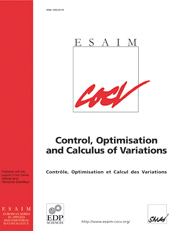Article contents
Differential games of partial information forward-backward doubly SDE and applications∗
Published online by Cambridge University Press: 10 October 2013
Abstract
This paper addresses a new differential game problem with forward-backward doubly stochastic differential equations. There are two distinguishing features. One is that our game systems are initial coupled, rather than terminal coupled. The other is that the admissible control is required to be adapted to a subset of the information generated by the underlying Brownian motions. We establish a necessary condition and a sufficient condition for an equilibrium point of nonzero-sum games and a saddle point of zero-sum games. To illustrate some possible applications, an example of linear-quadratic nonzero-sum differential games is worked out. Applying stochastic filtering techniques, we obtain an explicit expression of the equilibrium point.
Keywords
Information
- Type
- Research Article
- Information
- ESAIM: Control, Optimisation and Calculus of Variations , Volume 20 , Issue 1 , January 2014 , pp. 78 - 94
- Copyright
- © EDP Sciences, SMAI, 2013
References
- 9
- Cited by

